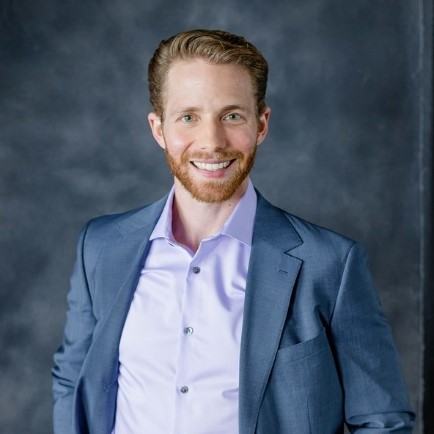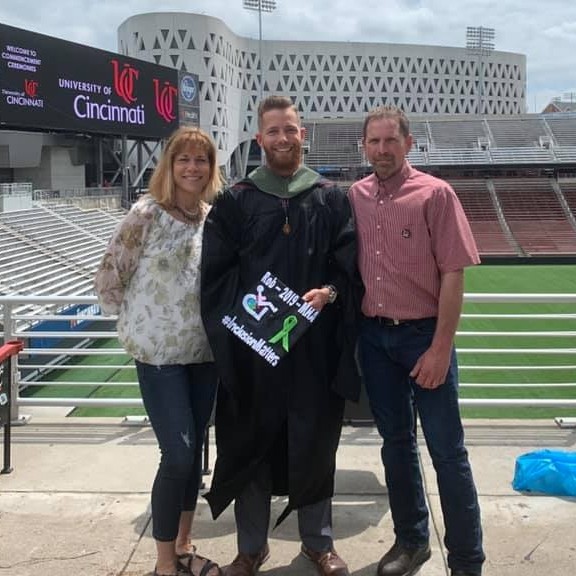
CAHS alumni spotlight: Rob Marty
During National Allied Health Week, we're interviewing CAHS alumni who are making a difference.

Name: Robert (Rob) Marty
Title: Chief Operating Officer
Employer: Chase Specific Nutrition
UC Program: Graduate of the Master of Health Administration Program in 2019.
What does being an allied health professional mean to you?
Being an allied health professional means being an intentional and persistent ally. This means being an ally to our healthcare providers in the pursuit of the quadruple aim of healthcare (enhancing patient experience, improving population health, reducing cost and improving the work life of healthcare providers). This also means acknowledging the U.S. healthcare system does not equally represent or support minorities, vulnerable populations and others and acting intentionally as an ally to improve healthcare for these groups.
When and why did you know you wanted to pursue a career in your field?
I realized I wanted to be active in healthcare advocacy and pursue a career in healthcare while I worked as a wellness educator at a Home Healthcare Agency that supported people with intellectual and developmental disabilities (IDD).
Working closely with nurses and advocates for people with IDD opened my eyes to disparities in healthcare I was unaware of as a white, able-bodied male. This experience was eye-opening for me and made me realize the status quo in healthcare my privilege enabled me was not the reality for many Americans. My “Why” for working in healthcare is these groups of people. People who deserve equitable, inclusive and quality-driven healthcare services delivered to them in an accessible and cost-effective manner. The “How” I do this continues to evolve as I spend more time in healthcare learning from individuals much smarter than I who have been working on these barriers and lapses in quality.
What do you love most about your career or current role?
The thing I love most about my career are the people. The people working to improve quality, the people providing the service and the people seeking healthcare. Their stories and experiences give me hope and motivation to continue working in healthcare, even when progress is slow.
What steps have you taken to get where you are today?
My steps to get to where I am today have included networking, continuous education and self-care. Just about every industry has a bit of, “it’s who you know.” Healthcare can be extremely isolating and frustrating. Intentional networking has led to countless conversations that have given me hope, opened doors and led to collaborative efforts with like-minded and deeply compassionate groups and individuals. Continuous education has helped me stay up to date on healthcare lingo, regulations, innovation and people or group-based initiatives. Examples include my MHA at UC, the pursuit of my doctorate at Liberty University (anticipated graduation in April 2024), listening to podcasts / books and attending conferences. Finally, I wouldn’t be where I am without self-care. Burnout across healthcare is high, and we need everyone we can get to create a better system. We cannot take care of others appropriately if we neglect to take care of ourselves. Little things like prioritizing quality sleep, hydration, movement, proper nutrition and maintaining our meaningful relationships are the keys to a long, fruitful, healthcare career.
How did UC prepare you and set you up for success in your career?
The MHA program at UC provided me with an in-depth education that paired with the work experience I was getting at the Home Healthcare Agency. I graduated in 2019 and have continued benefiting from the relationships I developed with other students and professors. I’m a firm believer that programs like UC’s MHA paired with work experience result in a foundation of knowledge capable of supporting allied health professionals and change agents (people actively seeking to produce meaningful change in their industry) in their pursuit to make a significant difference in their career.
What encouragement or advice can you offer to fellow professionals in your field or others looking to enter the profession?
The advice I’d offer fellow professionals or others looking to enter the healthcare industry would be to remember, “it is NOT what it is,” rather, “it IS what YOU make it.” Healthcare will reflect the values and demands we demand, and as good stewards of healthcare, we must be willing to demonstrate our commitment to these values with our words and actions. It is an employee market, and healthcare professionals are in high demand. Be ready to, respectfully, voice your concerns and move on to your next opportunity if your current organization does not enable you to serve your community according to the true purpose of a healthcare organization.
What are you most proud of thus far in your career, and what do you hope to accomplish in the future?
Thus far in my career, the thing I am most proud of would have to be the curiosity I’ve been able to maintain. At some point, many of us lose our sense of interest due to strict policies, and this can result in personal burnout and poorer quality outcomes for those we support. I have a framing technique I like to use before I go into any meeting or conference that helps me keep an open mind and approach each idea I hear with curiosity.
As for my hope for the future, I’m pursuing my doctorate because I want to get more involved in local, state, and federal healthcare policy initiatives. At this time, I’m not sure what that means for my career, but I know that I’ll figure it out as I continue to network with healthcare leaders and public health experts.
Is there anything else you would like to share: advice, misconceptions, unpopular opinions related to your field of work?
- Here are a few messages I think would make great bumper stickers:
- Self-care is the opposite of selfishness.
- Be relentless, but respectful, in your pursuit of change.
- There’s a reason you feel the way you do.
- We need fewer “experts” and more coaches.
A brain full of knowledge and jargon is no good to someone who is struggling with food security or cannot afford their medication.
2. If someone does not know you, they should not give you healthcare advice.
The internet has resulted in an abundance of health and wellness advice, and while this can be empowering, before someone applies guidance from the internet to themselves, they should ask how they know it’s appropriate for them. Finding a PCP, therapist, or dietitian who will get to know you and give you specific guidance based on your life, goals and health is always best practice.
3. Take your business to someone who listens and empowers you.
As patients and participants in healthcare, if your current provider does not listen to you / make you feel heard and involved in your healthcare, take your business elsewhere.
4. Misconception – registered dietitians are only appropriate for certain circumstances.
Everyone can benefit from working with a dietitian because we all have unique food preferences, responses to different foods and goals and making sense of food on our own is frustrating. Dietitians are an exceptional resource, and insurance coverage for these services has come a long way.
Related Stories
CAHS alumni spotlight: Rob Marty
October 31, 2023
To celebrate Allied Health Week, the College of Allied Health Sciences is pleased to recognize Rob Marty, alumni of the Master's of Health Administration program.
CAHS Alumni Spotlight: Elit Gonzalez
October 31, 2023
To celebrate Allied Health Week, the College of Allied Health Sciences is pleased to recognize Elit Gonzalez, alumni of the Health Information Management program.
Lindner Alumni Spotlight - Allison Brucato ’15
March 24, 2021
Lindner Alumni Spotlight - Allison Brucato


